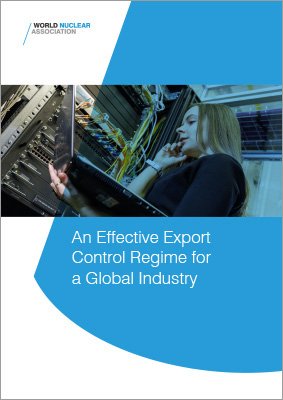An Effective Export Control Regime for a Global Industry
Nuclear energy is making a growing contribution to low-carbon electricity supply around the world. Annual trade in nuclear fuel, reactor systems and components has the potential to increase from about $14 billion today to nearly $40 billion by 2035. Achieving this potential could depend in part on the introduction of a more streamlined and flexible approach to trade, as has occurred in other strategic sectors.
 The civil nuclear power industry operates under a special regulatory regime designed to ensure a high level of safety and to safeguard its technology against misuse. An overarching regulatory framework is provided by the International Atomic Energy Agency (IAEA) but authority for controlling international trade in nuclear technology, goods and services rests with national governments. Inevitably there are differences in regulation and a web of bilateral and multilateral agreements has been built up since the 1950s. These differences and uneven licensing procedures for nuclear exports can hinder lawful and compliant international trade in nuclear materials and technology and safety-related information exchange.
The civil nuclear power industry operates under a special regulatory regime designed to ensure a high level of safety and to safeguard its technology against misuse. An overarching regulatory framework is provided by the International Atomic Energy Agency (IAEA) but authority for controlling international trade in nuclear technology, goods and services rests with national governments. Inevitably there are differences in regulation and a web of bilateral and multilateral agreements has been built up since the 1950s. These differences and uneven licensing procedures for nuclear exports can hinder lawful and compliant international trade in nuclear materials and technology and safety-related information exchange.
This report examines one aspect of the international regulatory regime: the licensing regime for nuclear exports. The World Nuclear Association proposes changes to the export control system that will simplify, streamline and modernize these procedures whilst maintaining international safety and security. Governments can encourage the development of an international nuclear energy industry operating to the highest of standards by the removal of some of the procedural obstacles that are hindering legitimate trade and exchange of information and by fostering a level playing field for compliance.